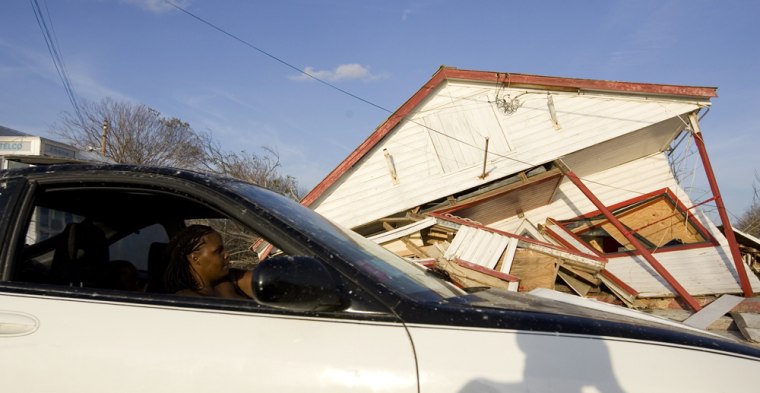Hurricane Ike swirled over the Gulf of Mexico on Wednesday, targeting Texas near the U.S. offshore oil patch after toppling decrepit buildings in Cuba's capital and ripping the communist-run island from end to end.
Ike left a long trail of destruction across the Caribbean and had energy companies fearful it could do the same to their gulf oil rigs as they scurried to evacuate workers and shut down production.
Ike was regaining power in the gulf's warm waters and forecasters expected it to become a major storm again, revving up to a Category 3 on the five-step hurricane intensity scale with a minimum of 115 mph winds.
In Cuba, big waves and storm surges were expected to subside on Wednesday, but heavy rains on the western end of the island could produce flash floods, officials said.
Ike has already caused widespread damage in Cuba. State-run media showed a panorama of destruction across the island, still reeling from the more powerful Hurricane Gustav 10 days ago.
Punishing blow
Cuban state television said some 2.6 million people — nearly a fourth of the island's population — sought refuge from Ike, which killed four people and shredded hundreds of homes as it swept across the country.
As it left Cuba, Hurricane Ike delivered a punishing blow to towns such as Los Palacios, which already suffered a direct hit from a Category-4 Hurricane Gustav on Aug. 30.
In a poor neighborhood along the train tracks, the combined fury of Ike and Gustav left nearly two-thirds of the wooden homes without roofs or completely leveled.
"The first one left me something, but this one left me nothing," said Olga Atiaga, a 53-year-old housewife. Gustav obliterated her roof and some walls. Then Ike blew away a mattress and smashed the kitchen sink.
"I don't even have anything to sleep on," she said.
Ike struck eastern Cuba on Sunday with 120 mph winds and torrential rains that destroyed buildings, wiped out the electricity grid, toppled trees, leveled crops including sugar cane fields, and turned rivers into roaring torrents.
After up to 15 inches of rain fell on the island the downpour continued on Wednesday even as Ike moved away, causing widespread flooding and growing alarm among officials.
Ike's damage could total between $3 billion and $4 billion, according to some official sources, said Elisabeth Byrs of the U.N. Office for the Coordination of Humanitarian Affairs at a news briefing in Geneva.
'Army of ghosts'
Havana, which barely escaped the full wrath of Gustav, was pounded by Ike's winds and rain on Monday and Tuesday, which toppled at least 16 of the many beautiful but crumbling old buildings in the capital.
"It sounds like Havana has been invaded by an army of ghosts," Havana resident Maria Valdez said, referring to the howling winds that blew through streets littered with fallen trees, foliage and debris.
No deaths were reported from Gustav, but state-run Prensa Latina said on Tuesday it damaged 140,000 buildings — 90,000 of them homes — when it blasted across the Isle of Youth and westernmost province of Pinar del Rio.
After crossing the eastern provinces, Ike dipped into the Caribbean and headed northwest where it made its second Cuba landfall on Tuesday at Punta la Capitana in westernmost Pinar del Rio province.
The storm ripped across the same region struck by Gustav before leaving the island near the town of Manuel Sanguily on Pinar del Rio's north central coast.
Before Cuba, Ike hit Britain's Turks and Caicos Islands and the southern Bahamas as a ferocious Category 4 hurricane. Floods triggered by its torrential rains were blamed for at least 71 deaths in Haiti, where Tropical Storm Hanna killed 500 last week.
The United Nations said it would launch an emergency appeal for money with about 800,000 people in Haiti in need of urgent help, nearly half of them children. The impoverished country has been hit by four storms in a month.
